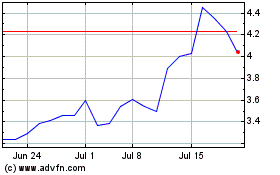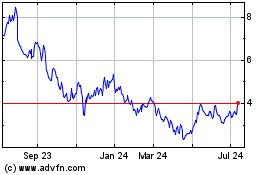Adaptive Biotechnologies Highlights New Data at ASCO 2023 and EHA 2023 Underscoring the clonoSEQ® Assay’s Impact as a Standard for Minimal Residual Disease Assessment in Patients with Hematologic Cancer
June 02 2023 - 7:34AM

Adaptive Biotechnologies Corporation (Nasdaq: ADPT), a commercial
stage biotechnology company that aims to translate the genetics of
the adaptive immune system into clinical products to diagnose and
treat disease, will be included in several oral and poster
presentations investigating the clinical significance of minimal
residual disease (MRD) assessment at the American Society of
Clinical Oncology (ASCO) Annual Meeting taking place June 2-6 in
Chicago, as well as the European Hematology Association (EHA)
Hybrid Congress taking place June 8-11 in Frankfurt, Germany. Data
will be presented from clinical trials and real-world evidence
studies using Adaptive’s next-generation sequencing (NGS)-based
clonoSEQ® Assay for MRD assessment across a range of hematologic
cancers.
“The clinical trial and real-world evidence that is being
presented this year at ASCO and EHA showcase clonoSEQ’s utility as
the gold standard in MRD assessment both to inform clinical
decision making and help assess deep responses to novel
therapeutics in patients with hematologic cancers,” said Nitin
Sood, chief commercial officer, MRD, at Adaptive Biotechnologies.
“Adaptive has demonstrated the value of NGS-MRD assessment in
hematologic cancers. The use of MRD assessment in clinical trials
and practice continues to mount, and we are pleased to see new data
generated that attest to its benefit for physicians, patients and
researchers alike.”
MRD can be used to assess depth of response and detect early
signs of relapse prior to clinical symptoms. This assessment is
performed as a series of tests in clinical trials and throughout a
patient’s cancer journey. The clonoSEQ Assay is the first and only
NGS-MRD test authorized by the U.S. Food and Drug Administration
(FDA) for MRD assessment in certain hematologic malignancies. The
assay is also offered as a CLIA-validated laboratory developed test
for assessing MRD in diffuse large B-cell lymphoma (DLBCL).
The clinical findings presented at both ASCO and EHA highlight
the prognostic value and clinical actionability of precise,
sensitive MRD assessment in hematologic cancers utilizing the
clonoSEQ Assay.
- In various stages of multiple myeloma (MM), real-world evidence
and clinical trial results reinforce the clinical significance of
sustained MRD negativity and depth of response in the prediction of
patient outcomes, including overall survival and progression free
survival (PFS).
- In adults with acute lymphoid leukemia (ALL), real-world
evidence found a higher rate of residual disease detection by
clonoSEQ as compared to detection with flow cytometry. This data
underscores the highly accurate, sensitive and standardized
properties of clonoSEQ as compared to other technologies used to
assess disease burden.
- Data continues to show the potential for MRD assessment to help
in the personalization of cancer care. For example, interim data in
older patients with DLBCL demonstrated that the use of MRD
assessment from ctDNA with clonoSEQ in combination with imaging has
potential to inform treatment decisions to shorten the duration of
therapy.
- Final analysis from the multi-center Phase 2 MASTER trial
showed that in newly diagnosed MM patients treated with quadruplet
therapy and monitored using clonoSEQ, the three-year PFS was higher
in patients with sustained MRD negativity compared to those who did
not achieve MRD negativity. Furthermore, 73% of patients that
discontinued therapy based on their MRD status remained free of
therapy with sustained MRD negativity. The MASTER trial has been
key for studying the feasibility of an MRD-informed approach to
treatment discontinuation. The final outcomes reinforce that
patients who achieve MRD negativity over time, as measured by
clonoSEQ, may be able to discontinue treatment to find relief from
treatment side effects and enable substantial savings for the
health care system.
- Presentations will also highlight the value of utilizing
NGS-MRD testing in clinical trials to assess the effectiveness of
investigational, novel therapeutics.
Key ASCO 2023 Presentations
|
Presentation Type and Number |
Title |
Presentation Timing |
|
Multiple Myeloma |
|
Oral Abstract 8001 |
Maintenance therapy with carfilzomib, pomalidomide, and
dexamethasone (KPd) in high-risk myeloma patients (pts): A phase 2
study with a safety run-in |
Saturday, June 31:15-4:15 p.m. CDT |
|
Poster Abstract 8028 |
Measurable residual disease (MRD) and clonal diversity for multiple
myeloma treatment monitoring |
Monday, June 58:00-11:00 a.m. CDT |
|
Poster Abstract 8029 |
Long-term outcomes with isatuximab-carfilzomib-dexamethasone
(Isa-Kd) in relapsed multiple myeloma patients with 1q21+ status:
Updated results from the phase 3 IKEMA study |
Monday, June 58:00-11:00 a.m. CDT |
|
Poster Abstract 8031 |
Baseline and early post-infusion biomarkers associated with optimal
response to idecabtagene vicleucel (ide-cel) in the KarMMa-3 study
of triple-class–exposed (TCE) relapsed and refractory multiple
myeloma (RRMM) |
Monday, June 58:00-11:00 a.m. CDT |
|
Poster Abstract TPS8066 |
MagnetisMM-7: An open-label, multicenter, randomized phase 3 study
of elranatamab versus lenalidomide in post-transplant patients with
newly diagnosed multiple myeloma |
Monday, June 58:00-11:00 a.m. CDT |
|
Poster Abstract 8009 |
CARTITUDE-1 final results: Phase 1b/2 study of ciltacabtagene
autoleucel in heavily pretreated patients with relapsed/refractory
multiple myeloma |
Monday, June 53:00-4:30 p.m. CDT |
|
Acute Lymphoblastic/Lymphoid Leukemia |
|
Oral Abstract 7007 |
A phase I trial of dose-adjusted EPOCH plus inotuzumab ozogamicin
(InO) in adults with relapsed/refractory (R/R) B lymphoblastic
leukemia/lymphoma (B-ALL) |
Friday, June 21:00-4:00 p.m. CDT |
|
Poster Abstract 7033 |
Comparison of next-generation sequencing and flow cytometry in
detecting minimal residual disease in adult acute lymphoid
leukemia: Evaluating clinical outcomes in a single-center
study |
Monday, June 58:00-11:00 a.m. CDT |
|
Non-Hodgkin’s Lymphoma |
|
Poster Abstract 7554 |
Phase II trial of split-dose R-CHOP for older patients with diffuse
large B-cell lymphoma (DLBCL) |
Monday, June 58:00-11:00 a.m. CDT |
Key EHA 2023 Presentations
|
Presentation Type and Number |
Title |
Presentation Timing |
|
Multiple Myeloma |
|
Poster Abstract P931 |
Isatuximab in relapsed multiple myeloma patients with
ultra-high-risk cytogenetics: ICARIA-MM and IKEMA subgroup
analysis |
Friday, June 96:00 p.m.-7 p.m. CEST |
|
Poster Abstract P871 |
Idecabtagene vicleucel (ide-cel) in patients with an inadequate
response to frontline autologous stem cell transplantation (ASCT):
results from KARMMA-2 cohort 2C |
Friday, June 96:00 p.m.-7:00 p.m. CEST |
|
Oral Abstract S203 |
Quadruplet induction therapy, ASCT and MRD-modulated consolidation
and treatment cessation in newly diagnosed multiple myeloma: final
analysis of the MASTER trial |
Saturday, June 102:45 p.m.-4:15 p.m. CEST |
|
Chronic Lymphocytic Leukemia |
|
Poster Abstract P620 |
Genetic alterations and outcomes with fixed-duration
ibrutinib+venetoclax (Ibr+Ven): results from the Phase 3 GLOW study
in patients with previously untreated CLL |
Friday, June 96:00 p.m.-7:00 p.m. CEST |
About the clonoSEQ AssayThe clonoSEQ Assay is
the first and only FDA-cleared in vitro diagnostic (IVD) test
service to detect minimal residual disease (MRD) in bone marrow
from patients with multiple myeloma (MM) or B-cell acute
lymphoblastic leukemia (B-ALL) and blood or bone marrow from
patients with chronic lymphocytic leukemia (CLL). clonoSEQ testing
for diffuse large B-cell lymphoma (DLBCL) patients is currently
available for clinical use as a laboratory-developed test (LDT)
performed at Adaptive's CLIA-certified lab in Seattle, WA. Medicare
covers clonoSEQ in these four indications and is aligned with
clinical practice guidelines which support assessing MRD at
multiple time points throughout therapy to monitor treatment
response and help predict patient outcomes.
The clonoSEQ Assay leverages Adaptive Biotechnologies’
proprietary immune medicine platform to identify and quantify
specific DNA sequences found in malignant cells, allowing
clinicians to assess and monitor MRD during and after treatment.
The assay provides standardized, accurate, and sensitive
measurement of MRD that allows physicians to predict patient
outcomes, assess response to therapy over time, monitor patients
during remission, and predict potential relapse. Clinical practice
guidelines in hematological malignancies recognize that MRD status
is a reliable indicator of clinical outcomes and response to
therapy, and clinical outcomes have been shown to be strongly
associated with MRD levels measured by the clonoSEQ Assay in
patients diagnosed with CLL, MM, ALL and DLBCL.
For important information about the FDA-cleared uses of
clonoSEQ, including the full intended use, limitations, and
detailed performance characteristics, please
visit www.clonoSEQ.com/technical-summary.
About Adaptive BiotechnologiesAdaptive
Biotechnologies (“we” or “our”) is a commercial-stage biotechnology
company focused on harnessing the inherent biology of the adaptive
immune system to transform the diagnosis and treatment of disease.
We believe the adaptive immune system is nature’s most finely tuned
diagnostic and therapeutic for most diseases, but the inability to
decode it has prevented the medical community from fully leveraging
its capabilities. Our proprietary immune medicine platform reveals
and translates the massive genetics of the adaptive immune system
with scale, precision and speed. We apply our platform to partner
with biopharmaceutical companies, inform drug development, and
develop clinical diagnostics across our two business areas: Minimal
Residual Disease (MRD) and Immune Medicine. Our commercial products
and clinical pipeline enable the diagnosis, monitoring, and
treatment of diseases such as cancer, autoimmune disorders, and
infectious diseases. Our goal is to develop and commercialize
immune-driven clinical products tailored to each individual
patient.
Forward Looking Statements This press release
contains forward-looking statements that are based on management’s
beliefs and assumptions and on information currently available to
management. All statements contained in this release other than
statements of historical fact are forward-looking statements,
including any statements regarding our market acceptance of our
current and planned products and services, our research and
development efforts, and other matters regarding our business
strategies, use of capital, results of operations and financial
position, and plans and objectives for future operations.
In some cases, you can identify forward-looking statements by
the words “may,” “will,” “could,” “would,” “should,” “expect,”
“intend,” “plan,” “anticipate,” “believe,” “estimate,” “predict,”
“project,” “potential,” “continue,” “ongoing” or the negative of
these terms or other comparable terminology, although not all
forward-looking statements contain these words. These statements
involve risks, uncertainties and other factors that may cause
actual results, levels of activity, performance or achievements to
be materially different from the information expressed or implied
by these forward-looking statements. These risks, uncertainties and
other factors are described under "Risk Factors," "Management's
Discussion and Analysis of Financial Condition and Results of
Operations" and elsewhere in the documents we file with the
Securities and Exchange Commission from time to time. We caution
you that forward-looking statements are based on a combination of
facts and factors currently known by us and our projections of the
future, about which we cannot be certain. As a result, the
forward-looking statements may not prove to be accurate. The
forward-looking statements in this press release represent our
views as of the date hereof. We undertake no obligation to update
any forward-looking statements for any reason, except as required
by law.
ADAPTIVE MEDIAErica Jones, Associate Director,
Corporate Communications206-279-2423media@adaptivebiotech.com
ADAPTIVE INVESTORSKarina Calzadilla, Vice
President, Investor
Relations201-396-1687investors@adaptivebiotech.com
Adaptive Biotechnologies (NASDAQ:ADPT)
Historical Stock Chart
From Apr 2024 to May 2024

Adaptive Biotechnologies (NASDAQ:ADPT)
Historical Stock Chart
From May 2023 to May 2024
